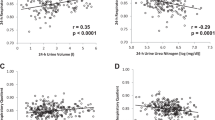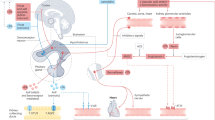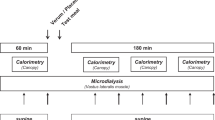Abstract
Alterations of cell volume induced by changes of extracellular osmolality have been reported to regulate intracellular metabolic pathways. Hypo-osmotic cell swelling counteracts proteolysis and glycogen breakdown in the liver, whereas hyperosmotic cell shrinkage promotes protein breakdown, glycolysis and glycogenolysis. To investigate the effect of acute changes of extracellular osmolality on whole-body protein, glucose and lipid metabolism in vivo, we studied 10 male subjects during three conditions: (i) hyperosmolality was induced by fluid restriction and intravenous infusion of hypertonic NaCl (2–5%, wt/vol) during 17 h; (ii) hypo-osmolality was produced by intravenous administration of desmopressin, liberal water drinking and infusion of hypotonic saline (0.4%); and (iii) the iso-osmolality study comprised oral water intake ad libitum. Plasma osmolality increased from 285±1 to 296±1 mosm/kg (P<0.001during hyperosmolality, and decreased from 286±1 to 265±1 mosm/kg during hypo-osmolality (P<0.001). Total body leucine flux ([1-13C]leucine infusion technique), reflecting whole-body protein breakdown, as well as whole-body leucine oxidation rate (irreversible loss of amino acids) decreased significantly during hypo-osmolality. The glucose metabolic clearance rate during hyperinsulinaemic–euglycemic clamping increased significantly less during hypo-osmolality than iso-osmolality, indicating diminished peripheral insulin sensitivity. Glycerol turnover (2-[13C]glycerol infusion technique), reflecting whole-body lipolysis, increased significantly during hypo-osmolar conditions. The results demonstrate that the metabolic adaptation to acute hypo-osmolality resembles that of acute fasting, that is, it results in protein sparing associated with increased lipolysis, ketogenesis and lipid oxidation and impaired insulin sensitivity of glucose metabolism.
This is a preview of subscription content, access via your institution
Access options
Subscribe to this journal
Receive 12 print issues and online access
$259.00 per year
only $21.58 per issue
Buy this article
- Purchase on Springer Link
- Instant access to full article PDF
Prices may be subject to local taxes which are calculated during checkout




Similar content being viewed by others
References
Arner P (1996): Regulation of lipolysis in fat cells. Diab. Rev. 4, 450–463.
Baquet A, Hue L, Meijer AJ, Van Woerkom GM & Plomp PJAM (1990): Swelling of rat hepatocytes stimulates glycogen synthesis. J. Biol. Chem. 265, 955–959.
Berneis K, Ninnis R, Häussinger D & Keller U (1999): Effects of hyper- and hypoosmolality on whole-body protein and glucose kinetics in humans. Am. J. Physiol. 276, E188–E195.
Beylot M, Martin C, Beaufrere J, Riou JP & Mornex R (1987): Determination of steady state and nonsteady-state glycerol kinetics in humans using deuterium labelled tracer. J. Lipid Res. 28, 414–422.
Bilz S, Ninnis R & Keller U (1999): Effects of hypo-osmolality on whole-body lipolysis in man. Metabolism 48, 472–476.
Cobelli C, Toffolo G, Bier D & Nosadini R (1987): Models to interpret kinetic data in stable isotope tracer studies. Am. J. Physiol. 253, E551–E564.
Finn J, Lindsay D, Clark M, Connolly A & Hill G (1996): Progressive cellular dehydration and proteolysis in critically ill patients. Lancet 347, 654–656.
Graf J & Häussinger D (1996): Ion transport in hepatocytes: mechanism and correlation to cell volume, hormone actions and metabolism. J. Hepatol. 24, 53–77.
Häussinger D (1996): The role of cell hydration for the regulation of cell function. Biochem. J. 313, 697–710.
Häussinger D, Hallbrucker S, vom Dahl S, Lang F & Gerok W (1990): Cell swelling inhibits proteolysis in perfused rat liver. Biochem. J. 272, 239–242.
Häussinger D & Lang F (1991): Cell volume in the regulation of hepatic function: a new mechanism for metabolic control. Biochem. Biophys. Acta 1071, 331–350.
Häussinger D, Lang F & Gerok W (1994): Regulation of cell function by the cellular hydration state. Am. J. Physiol. 267, E343–E355.
Häussinger D, Roth E, Lang F & Gerok W (1993): Cellular hydration state. An important determinant of protein catabolism in health and disease. Lancet 341, 1330–1332.
Hellerstein MK (1995): Isotopic studies of carbohydrate metabolism in non-insulin-dependent diabetes mellitus. Curr. Op. Endocrinol. Diab. 2, 518–529.
Horber FF, Horber-Feyder CM, Krayer S, Schwenk WF & Haymond MW (1989): Plasma reciprocal pool specific activity predicts that of intracellular free leucine for protein synthesis. Am. J. Physiol. 257, E385–E399.
Jéquier E & Felber JP (1987): Indirect calorimetry. Baillieres Clin. Endocrinol. Metab. 1, 911–935.
Stoll B, Gerok W, Lang F & Häussinger D (1992): Liver cell volume and protein synthesis. Biochem. J. 287, 217–222.
Acknowledgements
These studies were supported by the Swiss National Science Foundation (Grant No. 3239747.93).
Author information
Authors and Affiliations
Contributions
Guarantor: U Keller.
Contributors: U Keller, G Szinnai, K Berneis and S Bilz collaborated in writing the paper.
Corresponding author
Rights and permissions
About this article
Cite this article
Keller, U., Szinnai, G., Bilz, S. et al. Effects of changes in hydration on protein, glucose and lipid metabolism in man: impact on health. Eur J Clin Nutr 57 (Suppl 2), S69–S74 (2003). https://doi.org/10.1038/sj.ejcn.1601904
Published:
Issue Date:
DOI: https://doi.org/10.1038/sj.ejcn.1601904
Keywords
This article is cited by
-
Decreased intracellular water is associated with sarcopenic obesity in chronic haemodialysis patients
BMC Geriatrics (2023)
-
Total Body Water and Intracellular Water Relationships with Muscle Strength, Frailty and Functional Performance in an Elderly Population. A Cross-Sectional Study
The Journal of nutrition, health and aging (2019)
-
NCB5OR Deficiency in the Cerebellum and Midbrain Leads to Dehydration and Alterations in Thirst Response, Fasted Feeding Behavior, and Voluntary Exercise in Mice
The Cerebellum (2018)
-
Recovery in Soccer
Sports Medicine (2012)
-
Angiotensin inhibition and longevity: a question of hydration
Pflügers Archiv - European Journal of Physiology (2011)



